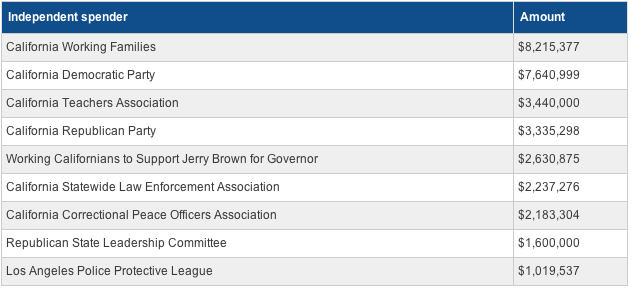
This article comes to us courtesy of California Watch
By Will Evans
California has some of the best public disclosure of independent political spending in the country, according to a report released yesterday, but the state ethics watchdog wants to go further.
The National Institute on Money in State Politics conducted a nationwide study of state independent expenditures – spending by political interests to influence an election independently from any candidate's campaign.
Unions, political parties and other interests spent $121.5 million on California independent expenditures from 2005 to 2010, more than in any other state, according to the report. California and eight other states – including Colorado, Washington and Oklahoma – got a perfect score on disclosure from the institute. Six states, on the other hand – including Alabama, Indiana, New Mexico and South Carolina – earned a zero for disclosure.
Ann Ravel, chairwoman of the state Fair Political Practices Commission, said California can do even better.
"I think we can do more and we should do more, because there are things that are slipping through the cracks," she said.
Ravel said she plans to ask commissioners next month for permission to sponsor a bill to improve oversight of independent expenditures. While state committees must report contributions and expenditures within 24 hours during the 90-day period before an election, those rules affect local committees starting only 14 days before an election. Ravel would like to see all committees subject to the 90-day provision.
"The local level is particularly important because it can really make a difference in an election," Ravel said.
Ravel also would like to require the disclosure of the top two contributors above $50,000 on any print advertisement paid for by an independent expenditure committee. Currently, that rule applies only to broadcast ads and direct mail, she said.
Independent committees backing ballot measures sometimes disappear after an election, and the commission lacks the power to go after the committee's officers if they committed violations. Ravel would like to see that change, too.
"There’s nothing in the law that holds them culpable," she said. "It’s been problematic in terms of enforcement."
As California forges ahead, though, the institute's study found disclosure to be lacking nationwide. "State disclosure of independent spending is incomplete and inadequate right now," said study author Kevin McNellis. "There was rarely a state where we didn’t encounter significant problems accessing the data, let alone analyzing it." In Florida, McNellis said, the expenditures are reported, but not the candidates they are targeting, rendering the information much less meaningful. Other states, like Michigan, disclose spending on ads that explicitly say to "vote for" or "vote against" a candidate, but not for ads that support or attack candidates more subtly. Nationwide, independent spending increased 69 percent from 2006 to 2010. If it reaches the level and prominence that super political action committees have achieved on the federal level, McNellis said, "we’re kind of in trouble, because the disclosure systems that are in place right now are not good." California's disclosure is good, but disclosure isn't everything, said campaign finance expert Bob Stern. "There's an awful lot of money that’s being given, so that’s the problem," he said. Stern would like to see strict limits on independent spending, but that likely won't be happening soon. The U.S. Supreme Court has ruled that such spending can't be restricted because, unlike direct contributions to candidates, it doesn't have a corrupting influence. Stern argues the spending can unduly influence politicians. He points to Las Vegas casino magnate Sheldon Adelson and the millions of dollars he and his wife gave to a super PAC backing Newt Gingrich in the Republican presidential primary. "You don’t think Gingrich is going to pay attention to what Adelson wants?" Stern said. In California, the top independent spender for 2010 was a committee called California Working Families, which backed Jerry Brown's campaign for governor with more than $8 million, according to the institute. Some states don't require such committees to disclose who funds them, but California does. California Working Families, for example, collected millions from the Service Employees International Union. Other unions representing firefighters, construction workers and teachers chipped in, too, as did billionaires Eli Broad and Ron Burkle.
Top California independent spenders in 2010

Source: National Institute on Money in State Politics
Will Evans is an investigative reporter for California Watch, a project of the non-profit Center for Investigative reporting. Find more California Watch stories here.